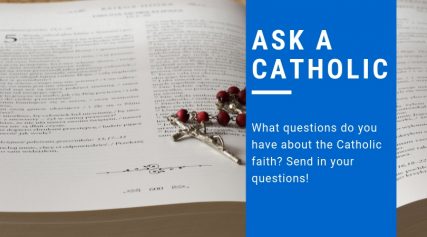What questions do you have about Catholicism? Submit them online, or fill out the form below.
By Mitch Finley
I love so much about my church; the Mass, rituals, art, the sacramentals, but the injustices I see—including vilification of LGBT people while those in power have continued to protect true predators is sickening. How do I separate my faith from the hypocrisy, in the face of so much . . . I hesitate to say ‘evil’ but yeah, evil done in the name of God?
I’m tempted to limit my response to your question to a brief quotation from the late, great priest-sociologist-novelist-religious thinker Father Andrew M. Greeley. In response to a question similar to yours he replied: “If you can find a perfect church go ahead and join it. But as soon as you do it won’t be perfect anymore.”
Your question deserves more than this, however, and I don’t wish to leave myself open to the accusation that I’m being merely glib. The fact is that all you say is, in varying degrees, true. I say “in varying degrees” because yes, some quite vocal Catholics, and even some priests and bishops, have been anything but charitable toward LGBT Catholics. Still, many have been, and are, supportive and welcoming of such folks. Indeed, in 1997 the U.S. Bishops’ Committee on Marriage and Family published a document titled “Always Our Children: A Pastoral Message to Parents of Homosexual Children and Suggestions for Pastoral Ministers.” You may want to .
Jesuit Father James Martin wrote a bestselling book, “Building a Bridge: How the Catholic Church and the LGBT Community Can Enter into a Relationship of Respect, Compassion, and Sensitivity.” This book garnered positive endorsements from, among others, Cardinal Kevin Farrell, who directs the Vatican’s office on “Laity, Family and Life,” and Bishop Wilton Gregory, of Atlanta. Indeed, there are far more bishops, priests, and everyday Catholics who support a charitable welcome to LGBT Catholics than condemn or do not welcome them in the church. Yes, there are Catholics who vilify Father Martin and his book, but there are many more who support him. Indeed, he can easily attract an appreciative, standing room only audience no matter where he goes. So it’s inaccurate to say that “the church” wants nothing to do with LGBT Catholics. Many Catholics are welcoming, some are not. Because the negative voices tend to attract mass media attention that doesn’t mean they’re in the majority.
As far as the clergy sex abuse crisis goes, yes there are bishops whose actions led to predator priests continuing to abuse children. Great evil was perpetrated on children because too many bishops, influenced by a form of clericalism, allowed some such priests to go on abusing. And clearly, while an effective response to all this seems now to be taking shape, it should have happened long ago. Keep in mind, however, that this isn’t just a Catholic problem, it’s a cultural one. Clergy from numerous Protestant denominations have committed identical crimes, as have prominent sports coaches and even physicians, notably Dr. Larry Nassar, who for years abused young female USA Gymnastics athletes.
Some Catholics, in the face of the clergy sex abuse crisis, choose to give up on being Catholic, so deeply are they scandalized by this great evil. Understandably so. But I don’t think this is necessarily the best or the most courageous choice. Why? It occurred to me that during their formative years many Catholics got the impression from parents and teachers that priests, bishops, and vowed women and men religious, could do no wrong. Many Catholics accepted this belief. Then, when the clergy sex abuse crisis dawned, they experienced a major crisis of faith. “The church” wasn’t perfect, after all. Far from it. Some priests and bishops made horrible choices and did great harm to innocent children. How could one remain in such a church?
Some Catholics departed for other churches or religions so hurt and scandalized were they by all this. They may even have decided that this was the only ethical option. This is worth further consideration, however. Perhaps abandoning Catholicism isn’t the best option. Perhaps a mature adult faith should accept that the church—which is all its members, including you and me—is imperfect, and it’s naive to believe otherwise. In the face of the clergy sex abuse crisis it’s appropriate to be shocked and scandalized, to be sure. But does it help those hurt by abusive priests and “cooperative” bishops if I give up on being Catholic?
Catholics don’t generally have a problem with the idea that we’re all imperfect and sinful and need God’s forgiveness. But what about “the church”? The institutional church needs our forgiveness sometimes, too, and if I need forgiveness, what right do I have to withhold forgiveness from others? Justice is demanded of those guilty of doing evil to children, including church and civil penalties such as release from the priesthood and time in prison But on a personal level they may be helped more by my forgiveness than by my abandonment of the Catholic faith. Indeed, to “leave the church” is to deprive oneself of a great grace, namely life in the community of faith, including the sacraments. I have no wish to condemn anyone who “leaves,” but it may well be that to do so is to shoot oneself in the foot, spiritually speaking.
Father Greeley was correct. “If you can find a perfect church, go ahead and join it. But as soon as you do it won’t be perfect anymore.” (If you’d like a far more extensive discussion of these topics, you may wish to read my book, “It’s Not the Same Without You: Coming Home to the Catholic Church.”)










